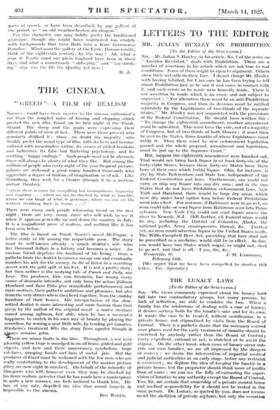THE CINEMA
" (MEE!) "—A. FILM OF REALISM
Nornixt: could have been sweeter to the cinema enthusiast's ear than the mingled noise of hissing and clapping which greeted the new film, Greed, on its first night at the Tivoli, Strand. The sheep and the goats were expressing their different points of view at last. There were those present who genuinely disliked it : those—no doubt the majority --who frankly prefer the usual type of film, with its hero and -heroine suffused with meaningless virtue, its scenes of gilded boudoirs and ballrooms, its false but flattering psychology, and its soothing " happy endings." Such people need not be alarmed, there will always be plenty of what they like. But among the millions of people who every night of the year frequent picture- palaceg are reckoned a good many hundred thousands who appreciate a degree of realism, of imagination, or of wit. Like Strindberg. they wish for a theatre (though it he a motion- picture theatre),
" where there is room for everything but incompetence, hypocrisy and stupidity . . . where we can be shocked by what is horrible, where we can laugh at what-is grotesque, where we can see life without' shrinking back in tetTor. . . ."
There were many such people witnessing Greed on the first night ; there are very many more who will wish to - sec it when it appears generally. up and down the-country in July. It is a magnificent piece of realism, and nothing like it has been seen before.
The film is based on Frank Norris's novel llicTeagne, a bitter study of life among the respectable poor. The story must be well known already—a quack dentist's wife wins live thousand dollars in a lottery and becomes a miser. An envious friend deprives the husband of his living : from a pathetic brute the dentist becomes a savage one and eventually murders his wife for the money, to die of thirst in a scorching desert with the gold spilt at his feet. It is not a pretty story, but then neither is the undying tale of Punch and Judy, nor Lear. The producer, Eric von Stroheirn, has wrung every ounce of dramatic intensity, net only from the actors (Gibson Howland and Zasu Pitts give remarkable performances) and their motives, their pathetic ambitions and pleasures, but also from the very streets where they herd together, from the .shabby furniture of their homes. His interpretation of the slow- witted dentist is more interesting and more human than that given by the author of the original novel—a coarse creature reared among ugliness, but. able, when he. has a -moment's happiness, to snatch in his own way at beauty by playing the accordion, by wooing a neat little wife, by tending pet canaries. Stroheim's treatment lifts the story from squalor though it
Sys remains grim.
here are minor faults in the film. Throughout, a not very pleasing yellow tinge is smudged in on all -brass, gilded and gold
objects, and -here and there unnecessary symbolism— large cat-faces, grasping hands and bars of metal—jars. But the producer of Greed must be reckoned with the few men who are really contributing to the development of the motion picture (they are now eight in number). On behalf of the minority of film-goers who will, however even they may be shocked by his fierce realism, perceive that he has made here a masterpiece in quite a new manner, one feels inclined to thank him. He has, at any rate, dispelled the idea that sound tragedy is impossible to the cinema.
Inns BA RAY.














































 Previous page
Previous page